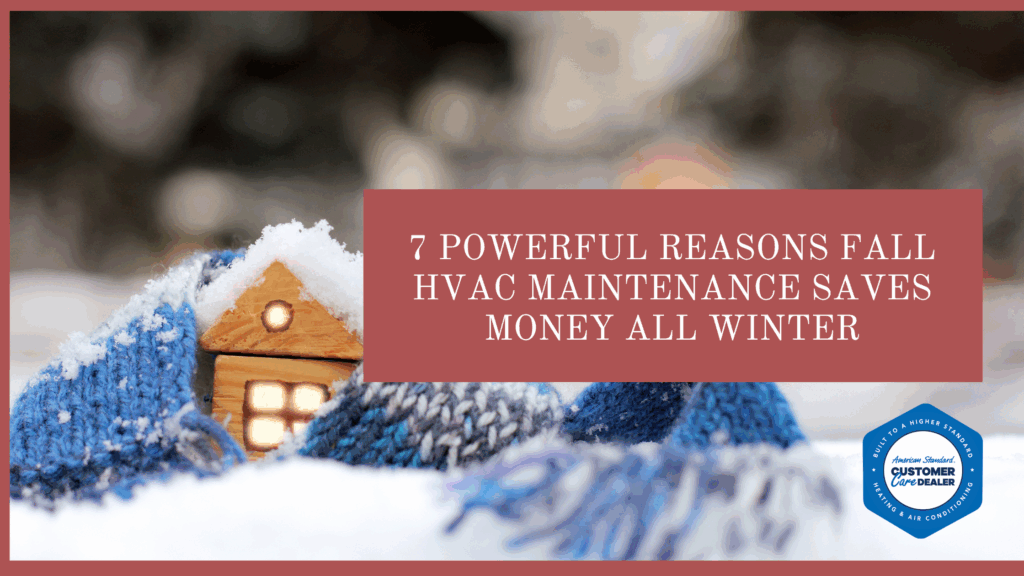7 Powerful Reasons Fall HVAC Maintenance Saves Money All Winter
As the leaves change color and the air grows crisp, it’s easy to get caught up in the beauty of fall. But while you’re sipping your pumpkin spice latte and pulling your favorite sweater from storage, there’s one essential home task that should top your seasonal checklist: fall HVAC maintenance.
Skipping this critical upkeep might feel like a small oversight—until winter hits hard and your heating system falters, or worse, fails. Here’s why HVAC professionals and energy experts alike strongly recommend a fall tune-up and how this simple step can save you hundreds (if not thousands) in heating costs and repairs.
1. Prevent Expensive Winter Breakdowns
A fall HVAC inspection is your system’s annual check-up. Just like visiting the doctor for preventive care, having your HVAC system inspected and tuned up can help uncover minor issues before they snowball into major repairs. When HVAC technicians inspect your system in the fall, they check for worn-out parts, dirty burners, clogged filters, and other red flags. Fixing these early costs significantly less than an emergency call on a freezing winter night when your furnace suddenly gives out.
Pro tip: Preventative maintenance costs far less than emergency repairs—and is usually faster and less stressful.
2. Lower Your Winter Energy Bills
Your HVAC system works harder in the winter, especially during prolonged cold spells. If your system isn’t running at peak efficiency, it’s going to use more energy to keep your home warm. That translates into higher monthly bills. Regular maintenance, like cleaning coils and changing filters, ensures your furnace or heat pump doesn’t overwork itself. A well-maintained system heats faster, distributes air more evenly, and consumes less power.
Did You Know? ENERGY STAR reports that proper HVAC maintenance can reduce energy usage by up to 15%.
3. Improve Indoor Air Quality
Fall is notorious for dust, pollen, and mold spores—many of which make their way into your home through vents and ductwork. When your HVAC system runs with a dirty filter or neglected ducts, it circulates allergens and pollutants that can irritate asthma or allergies. A fall tune-up often includes changing or cleaning filters, checking the ductwork, and cleaning internal components—all crucial steps for breathing cleaner, healthier air all winter long.
Pro tip: Consider upgrading to a HEPA filter or adding an indoor air purifier for extra protection during the closed-window months.
4. Extend the Life of Your HVAC System
Think of your HVAC system as you would your car. Regular oil changes and tune-ups keep your engine running longer. Likewise, routine HVAC maintenance minimizes wear and tear, ensuring your system lasts closer to its full 15–20-year lifespan. By skipping fall maintenance, you risk shortening your system’s life—and facing a costly replacement much sooner than necessary.
Savings Alert: Investing in regular maintenance now can save you the $4,000–$10,000 cost of a full system replacement down the line.
5. Maintain Warranty Coverage
Many HVAC manufacturers require proof of annual maintenance as a condition of keeping the warranty valid. If you skip regular tune-ups and later need repairs under warranty, you could be footing the bill yourself. Fall HVAC maintenance provides the documentation and service history you need to meet these warranty terms. A simple tune-up could be the difference between free repairs and a wallet-emptying service call.
6. Safer Winter Operation
A poorly maintained furnace or heating system can become a safety hazard. Dirty burners, cracked heat exchangers, and faulty sensors can lead to issues like carbon monoxide leaks, system overheating, or even fire risks. HVAC technicians inspect all critical safety components during a fall maintenance visit. This peace of mind is priceless—especially when your family is sleeping through long, cold nights with the heat running.
Don’t Risk It: Carbon monoxide is odorless and deadly. Ensure your system is properly vented and monitored with detectors.
7. Optimal Comfort All Season Long
There’s nothing worse than dealing with uneven heating or a drafty room when it’s below freezing outside. Fall maintenance ensures your system is balanced and calibrated for consistent comfort in every corner of your home. Technicians will check thermostats, inspect ducts, seal leaks, and ensure airflow is optimized—so you’re not wearing layers inside or relying on space heaters to stay warm.
Bonus: Many service providers offer fall HVAC maintenance specials and discounts before peak season begins.
Common Questions About Fall HVAC Maintenance
Q: How often should HVAC systems be serviced?
A: Twice a year—once in the fall for heating and once in the spring for cooling. This ensures optimal performance year-round.
Q: How long does a fall HVAC tune-up take?
A: Most visits take 1–2 hours, depending on the complexity of your system and any issues that may arise.
Q: What does a fall HVAC maintenance service include?
A: It typically covers checking and tightening electrical connections, inspecting the heat exchanger, cleaning burners, checking filters, lubricating moving parts, testing thermostat settings, and ensuring system safety.
Q: Can I do HVAC maintenance myself?
A: You can replace filters monthly and keep vents unblocked, but licensed technicians should handle inspections, testing, and repairs to avoid damaging your system or voiding warranties.
Q: What’s the average cost of fall HVAC maintenance?
A: Costs range from $75–$200. Some companies offer seasonal maintenance plans that bundle fall and spring services at a discount.
Contact Us
At Garrison & Garrison, we believe a warm, efficient home begins with a professionally maintained heating system. Whether you need a fall HVAC tune-up, a furnace inspection, or heating repair, we’re here to help keep your home safe and comfortable through every Alabama winter.
📞 Call us at (256) 859-8500
📧 Email us at [email protected]
🌐 Visit us at www.garrisonandgarrison.com
📱 Follow us: Facebook | Instagram
Make your home a haven this winter—because your comfort and safety matter.


